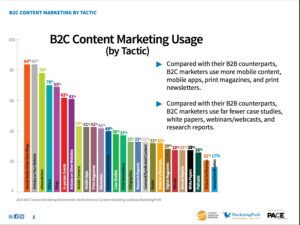Nothing makes me more confused and frustrated than when I anticipate one thing and get something entirely different. When this happens I think that I have failed to communicate clearly or manage my own expectations. (I.e. “How could Santa leave me a book when I clearly asked for a doll? Maybe the North Pole wasn’t making dolls this year and I shouldn’t have expected one.”) Lately however, I realize that the primary reason for mismatched outcomes is caused by how well people are listening. There’s a lot of hearing-what-you-want-the-person-to-be-saying going on rather than listening to what they are actually saying. (Yes, even Santa suffers from this condition from time to time —matching what’s in the inventory to what’s being said rather than what the client is actually saying.)
The Cross-Sell.
Think about the last time you set up a casual lunch with a business client to go over some “things” and at the last minute you decided to make it into a “cross-selling” call by bringing along a few other lawyers from your law firm—a tax lawyer and an IP lawyer. Your rationale was that all business people have taxes and most have intellectual property issues, right? And, since the law firm has put a significant emphasis on cross-selling lately, why not? Although the client was probably polite about the two new “products” you introduced, they really weren’t interested because they didn’t anticipate the scenario or want what you were trying to cross-sell. Quite possibly they were expecting the meeting to be about their agenda, not yours, and they were disappointed. In that case, hopefully the cross-sell moment died a quiet death. But, don’t believe for a minute that the client didn’t leave the lunch feeling confused or even frustrated because they didn’t accomplish what they anticipated. Cross-selling legal services, or any service, requires a delicate balance of timing and presentation that comes from active listening and trusted relationship.
A recent experience brought this to my attention in a dramatic fashion.
Listening.
This past January, I joined a newly established health club. Though it was five months later and I had not yet used it, mainly because the opening was delayed and they failed to communicate when they finally did open –bad way to start a business relationship—I stopped by the club to inquire about an orientation of the facility. Specifically I explained that I was promised when I bought the membership that someone would help me design a simple work out program. I also explained to the woman behind the counter that I was interested in the circuit equipment. She said she’d be happy to help me tomorrow at 2pm.
She got everything wrong…
I arrived at my scheduled time.
My objective: a friendly orientation of the facility’s features and a suggested work out routine on the circuit equipment.
The employee’s objective: sell me personal training services.
Although I had again explained to the very personable (and knowledgeable) employee that this was my first visit, she did not show me around the layout of the gym, instead she walked me to her “sales” desk…hmmm. I again, yes again, explained my objective for our meeting—set up a circuit program. She nodded her head and began to chitchat about my exercise history, my goals, my level of commitment, and etc. Fine. I gave her all that good stuff thinking it would help her help me get started using the membership I had purchased and had not yet benefited from. Several times during our conversation I again mentioned that I was most interested in circuit training and some cardio. I explained that I was not a big fan of classes or “exercises” that I could do at home. When we finished the chat at her sales desk, we were ready for my sample workout.
She walked me past the circuit equipment and over to the exercise floor. For ten minutes I did what she directed me to do; stand on a wobbly ball while lifting weights, lunges and leg kicks, i.e. exercises I could do at home without paying a membership fee –trust levels were dropping by the minute. Before the 10 minutes were up, I began to resent her for wasting my time, though I remained polite. I decided right then that whatever she was trying to sell me I didn’t want. It was apparent that she had HER agenda and was not interested in helping me with a circuit. The only voice she was listening to was her own. At that point I just wanted to get out of there.
Could I have benefited from a personal trainer? Probably, but I wasn’t ready. At that moment I didn’t want a personal trainer, I wanted a quick orientation to a circuit program. I wanted to experience some benefit from what I had already paid for. Had she done a few things right, for example listen to and act upon what I requested, I might have considered a few personal training sessions. Instead, I walked out with a strongly negative feeling toward the WHOLE CLUB.
How to earn my trust.
- While I’m not closed to learning more about the additional services you offer, first I want you to show me the value of what I already purchased.
- It’s really about me and you can’t miss that point. It’s not about you making your sale, it’s about me getting to know, like and trust you because you understand my goals.
- My time is valuable and I want you to show me that you understand that. If you can’t, why should I trust you?
- Once we’re on the same page, I want you to build a relationship with me, so when I need additional services I can trust you to steer me in an intelligent direction.
Lost opportunities.
The fitness instructor/sales person followed up with a phone call a week later and asked if I was ready to sign up for personal training. I laughed to myself and told her I was out of town and would contact her when I was interested. NOT!
What could have changed my response? If over time this fitness instructor saw me around the gym and stopped to ask how I was doing, give me a few pointers, and demonstrate her helpfulness, I might have purchased some training. Or, better yet, if the fitness instructor would have given me what I anticpated during that first meeting I might have been so convinced I’d have purchased more sessions on the spot. These few things could have turned around the outcome. How often do lawyers miss the forest for the trees? It’s so much easier to “sell” their services when the preparation is in place and that can only come from listening.
Which brings me to a final thought…if an opportunity (prospect or cross-sell) mysteriously disappears, you might want to ask yourself how well you were listening. It could be that you weren’t dialed in to what they were actually saying. And that happens to everyone as circumstances and communication styles differ…but when it happens to me, I’m going to make it a learning experience so I can do better next time.




Wow, you are so very on target with this post Jayne. You nailed it. It is all about the art of listening, and so many don’t get that point. Love this and tweeted it out.
Thanks for the Tweets and comment. You’ll be interested to know that the saga continues. Interacting with the operations manager of the fitness club yesterday revealed an systemic problem which obviously trickles down to the employees…More later…
Like that phrase: close-minded sales conversation. That’s exactly what this was. And yup, I’ve also seen lawyer teams in proposal presentations where they totally ignored the need. In some cases I was part of the preparation team that coached them in active listening and still they didn’t get it. I hope this graphic example helps anyone who struggles with listening…I know it helped me.